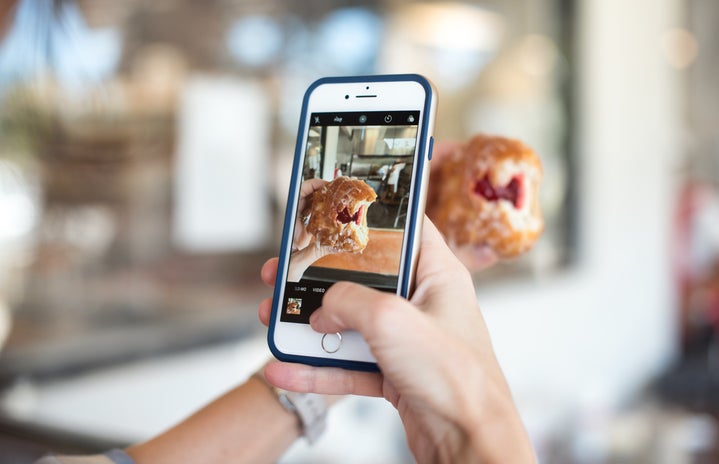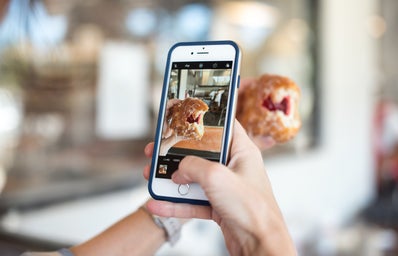There’s a reason collegiettes gain the infamous Freshman 15. Whether it’s the stress of classes, the busyness of trying to balance a full course load and a social life, or the seemingly unavoidable late-night snack temptations, there are so many aspects of college life that can lead us to develop some pretty poor eating habits. And here’s the kicker: once we’ve started, it’s not so easy to stop, especially when our schedules are as busy as ever. We talked to collegiettes to find out what bad eating habits you’ve picked up and got some expert advice from Vancouver-based nutritionist Elizabeth Campbell on how to turn these habits into healthier ones.
Bad Habit #1: Developing a dependence on coffee
Many of us feel like we need coffee in order to keep us alert for our early morning classes. If you’re relying on the caffeine in your coffee to get you through the day, you’re not the only one.
Phyu-Sin Than, a junior at Mount Holyoke College, who recently bought a coffee maker for her room, also has a self-described dependence on coffee. “I’ve picked up drinking coffee a lot, which suppresses hunger, and that’s not healthy. I’d be too busy to sit down and have a proper meal, so I usually end up snacking and having coffee a lot of the times.”
According to the FDA, having one to two 5 oz. cups of coffee isn’t very harmful (although some people are more sensitive to the effects than others), but if you’re having four to seven cups of coffee a day, you’re consuming too much caffeine.
Instead of reaching for caffeinated drinks, Campbell suggests starting your day with an antioxidant- and vitamin-filled green smoothie — made up of raw fruit and vegetables of your choosing. You’ll get energy from the natural sugars, in addition to fiber. “[Fiber’s] going to slow down the release of sugar into your bloodstream and keep you more at an even keel so that there isn’t any spiking or crashing in your blood sugar — which is something that coffee would do.”
Also make sure you’re well-hydrated throughout the day, especially in the morning. Campbell suggests starting the day with a bit of lemon or lime juice in your water to help cleanse your liver. “When we’re sleeping at night our liver is still cleansing all of our blood. A lot of times when we wake up in the morning and we’re still feeling a little bit groggy or tired, it just means that our liver hasn’t fully processed all the toxins out of our system.”
Check out this article if you want more advice on how to get energy without caffeine.
Bad Habit #2: Skipping breakfast or other meals
For many of us, sleeping in sounds like a better option than getting up a few minutes earlier to have a proper breakfast.
“I’m, unfortunately, still on a dining plan, so it’s hard to get to breakfast when it closes at 11am and I have class at 10 am. I just can’t wake up early enough to get there,” says Sonali Patel, a senior at Boston University. “More often than not I wake up late and then rush to class without any sustenance.”
Now Sonali is making an effort to eat breakfast, starting with changing her schedule. “This year I scheduled a gym class from 9 to 10 am, so I have no excuse for not being awake for breakfast. Now I just head over to the D-hall [dining hall] after my weight training and have a bowl of oatmeal or some eggs or some whole wheat pancakes and it is AMAZING. Breakfast is the best meal ever; why is it so easy to skip it?”
Campbell recommends having some fresh food available that you can take with you on the go, such as nuts and seeds, fresh fruit or a healthy granola bar.
She shared a quick and easy way to put together a healthy breakfast granola cereal:
- Put chia seeds in a bowl (about 2 tablespoons) — “The benefit of something like chia is when you add liquid to it, it expands but it also has all of your Omega-3s, which is good for grain stimulation and health,” says Campbell.
- Add some nuts and seeds — “[They] have your protein so that’s going to sustain you a little bit longer.”
- Add slices of dried or fresh fruit — “Having your dry fruit or fresh fruit in there is going to give you a lot of your vitamins and minerals.”
- Add milk (about ½ cup)
If you’re always rushing out the door in the morning, you can also prepare it at night and save it in a thermos in the fridge to grab in the morning.
Bad Habit #3: Too much alcohol, too many empty calories
Most of us indulge in more than a few drinks every now and then. While it’s easy to knock back a couple of beers or mixed drinks at a party, it’s also easy to forget how many calories we’re consuming with each drink. Alcoholic drinks also lack nutritional value and some are filled with ridiculous amounts of sugar.
According to the NIH [National Institutes of Health], a 12 oz. glass of beer is about 149 calories, but what you really have to look out for are cocktails, which can range from 122 to 460 calories per drink.
“The clearer the alcohol, usually the cleaner it’s going to burn in your body,” says Campbell. For a better alcoholic beverage alternative, try sticking to vodka or gin and mixing it with sparkling water. Other low-calorie chasers you can bring to parties are flavored seltzer, VitaminWater Zero, or diet sodas.
She also proposes drinking water in between alcoholic drinks so that you’re countering the dehydration that alcohol will cause.
If you find that you tend to excessively consume alcohol, try setting up goals for yourself, such as limiting the number of drinking days a week, setting a limited number of drinks you’ll have during a party, or exercising on days you plan to be drinking.
Bad Habit #4: Devouring comfort food while drunk or hungover
Not only are alcoholic drinks full of empty calories, they also cause us to crave salty and fatty foods. After a night of drinking, pizza and cheeseburgers start to sound really good.
“Drunk eating was one of my most terrible habits,” says Sonali. “Now I just go straight to bed when I come home, so if one of my friends texts me to get food, I don’t want to leave my bed.” She also keeps healthier alternatives (such as rice cakes, granola bars, veggies and hummus) in her room, just in case she gets any cravings.
To avoid drunk eating in the first place, have a solid meal before you leave in order to prevent cravings later on. “A little bit of fat is really nice when you’re drinking because it helps to slow down the release of alcohol in your bloodstream,” says Campbell. To satisfy your cravings for fat, go for healthier choices like cheese, bread with olive oil, or avocado.
When you’re hungover the next morning, the dehydration from the alcohol causes your body to lose electrolytes like potassium and sodium and results in cravings for bad hangover foods, Campbell says. She recommends replacing lost electrolytes by drinking coconut water before going to sleep, then drinking it again in the morning, along with lemon juice in water.
Bad Habit #5: Having meal replacement shakes or snacks in place of proper meals
We’re hopping from class to class, getting involved in extracurricular activities and trying to keep up some sort of a social life among other things. Sometimes we barely have time to eat, but we need the energy in order to keep up with the busyness of collegiette life.
“Well my eating habits have gone to the sh*tter,” says Miranda Gathercole, a recent graduate of Kwantlen Polytechnic University. “I skip meals [and] have resorted to meal replacement shakes when I’m busy.”
Sonali from Boston University also has trouble eating regular meals and sometimes lives off of cereal and granola bars when the line up at the dining hall is too long. “Sometimes, I don’t eat anything substantial until dinner; no breakfast, some yogurt and a granola bar for lunch in between classes and then I have my first actual meal at dinner. It’s ridiculous, terrible [and] troublesome, and I’m definitely trying to fix it.”
Having snacks instead of proper meals can also be a problem because the type of snacks we reach for to get energy are usually high in fat or carbohydrates.
“I started snacking all of the time instead of eating full meals, as I was really busy and they seemed so much more expensive to me,” says Abigail Colby, a recent graduate of Salisbury University. “However, this often results in carb overloading and a lot of eating at night. Recently I started making myself a filling breakfast of oatmeal or egg whites to try to get the day off to a strong, and cheap, start.”
If you need to bring snacks to munch on throughout the day, be sure to prepack snacks that contain fiber (fruits and vegetables, whole grains), protein (greek yogurt) and healthy fats (nuts).
Bad Habit #6: Eating in the name of being social
Food is central to many social events. We meet our friends for lunch, have dinner dates and attend club meetings just for the food (and networking, of course). This eventually becomes a problem because we start to eat even when we aren’t hungry and a lot of the time, the food at social events isn’t the healthiest.
“Social eating is definitely a problem in a sorority house because you want to eat with all your friends and they all get out of class at different times,” says Alexis Benveniste, a junior at Indiana University. “Sometimes it’s just whatever is for dinner but other times it’s late at night when everyone is snacking but you’re not even that hungry.”
A problem with social eating is that we don’t pay attention to how much we’re eating. Be conscious of what you’re putting in your mouth. Paying attention to calories might just stop you from overindulging.
Also, try telling your friends about your intentions to eat less or healthier while hanging out. That way, they can help hold you accountable and will understand if you choose not to be around tempting, unhealthy foods.
Just because you picked up some of these habits in college, doesn’t mean you’ll automatically kick them once you’re out. So, make a conscious effort now, rather than later, to replace these bad eating habits with good eating habits. It may be easier said than done, but it’ll definitely pay off!

